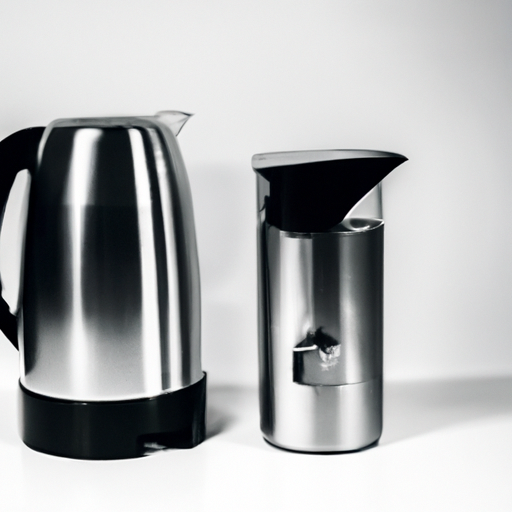When it comes to choosing the perfect coffee maker for your morning pick-me-up, the debate between stainless steel and plastic often arises. Both materials have their own set of advantages and disadvantages, making the decision a bit overwhelming. In this article, we will explore the pros and cons of each option, helping you make an informed choice that ensures the perfect cup of joe every time. So whether you prefer the sleekness of stainless steel or the affordability of plastic, read on to find out which material is better suited for your coffee making needs.
Durability
Stainless Steel Durability
Stainless steel coffee makers are known for their exceptional durability. The material is highly resistant to corrosion, stains, and rust, making it a reliable choice for long-term use. Stainless steel is robust and can withstand accidental drops and bumps without getting damaged easily. It is also less prone to cracking or shattering compared to plastic coffee makers, ensuring that your investment will last for many years. With its sturdy construction, you can enjoy your morning cup of coffee without worrying about the coffee maker breaking or failing.
Plastic Durability
Plastic coffee makers, on the other hand, may not offer the same level of durability as stainless steel. While some high-quality plastics can be quite resilient, they are generally more prone to scratches and damage from daily wear and tear. Over time, exposure to heat and repeated use may cause the plastic to become brittle and crack. Plastic coffee makers are generally more lightweight, which can make them more convenient for travel or on-the-go use. However, if you are looking for a coffee maker that will withstand the test of time, stainless steel is the superior choice in terms of durability.
Heat Retention
Stainless Steel Heat Retention
Stainless steel coffee makers excel in heat retention, which is critical in maintaining the desired brewing temperature. The metal retains heat efficiently, allowing the water to reach and maintain the optimal temperature for brewing flavorful coffee. This ensures that the coffee grounds are extracted properly and that you can enjoy a piping hot cup of coffee from start to finish. Stainless steel coffee makers often come with double-walled insulation, providing an additional layer of heat retention and ensuring that your coffee stays hot for an extended period.
Plastic Heat Retention
Plastic coffee makers tend to have less effective heat retention compared to their stainless steel counterparts. The material does not retain heat as well, leading to a quicker loss of temperature during the brewing process. This can result in coffee that may not be as hot as desired, especially if you prefer to savor your coffee slowly. If heat retention is a priority for you, a stainless steel coffee maker is the better option, providing a consistently hot and enjoyable coffee experience.
Brewing Temperature
Stainless Steel Brewing Temperature
Stainless steel coffee makers offer excellent control over brewing temperature. The material is highly resistant to heat and provides a stable environment for the brewing process. This allows you to achieve optimal extraction of flavors from the coffee grounds. With precise temperature control, you can customize your brewing experience to suit your preferences, from a milder taste to a more robust and flavorful cup of coffee.
Plastic Brewing Temperature
Plastic coffee makers may not offer the same level of control over brewing temperature as stainless steel. The material is more susceptible to heat fluctuations, which can affect the consistency and quality of the coffee extraction process. Inconsistent temperatures may result in under-extracted or over-extracted coffee, leading to a less desirable flavor profile. If you prioritize precise brewing temperature control, a stainless steel coffee maker is the better choice.
Aesthetics
Stainless Steel Aesthetics
Stainless steel coffee makers are renowned for their sleek and modern aesthetics. The polished finish of stainless steel adds a touch of sophistication to any kitchen countertop. The material’s timeless appeal blends seamlessly with various kitchen decor styles, from contemporary to traditional. Stainless steel coffee makers often come in a range of designs and finishes, allowing you to choose one that best suits your personal taste and complements your kitchen aesthetic.
Plastic Aesthetics
Plastic coffee makers usually have a more casual and playful aesthetic. They come in a wide array of colors and designs, offering a vibrant and fun look to your kitchen. If you prefer a coffee maker that adds a pop of color or a whimsical touch to your kitchen decor, plastic coffee makers offer a wider range of options. However, if you prefer a more elegant and sophisticated appearance, stainless steel coffee makers are the better choice.
Maintenance and Cleaning
Stainless Steel Maintenance
Stainless steel coffee makers are relatively low-maintenance and easy to clean. The smooth surface of stainless steel prevents stains and makes it easier to wipe off any coffee residue or fingerprints. Most stainless steel coffee makers are also dishwasher safe, allowing for convenient cleaning when needed. Regular maintenance includes descaling to remove mineral deposits and ensuring that the brewing components, such as the filter, are cleaned thoroughly. With proper care, a stainless steel coffee maker can maintain its pristine appearance and functionality for years to come.
Plastic Maintenance
Plastic coffee makers require similar maintenance as stainless steel coffee makers. However, the nature of plastic makes it more prone to staining, especially if coffee residue is not promptly cleaned. Depending on the quality of the plastic, it may also be susceptible to scratches during cleaning. While some plastic coffee makers are dishwasher safe, others may require handwashing to avoid potential damage. It is important to follow the manufacturer’s instructions for cleaning and maintenance to ensure the longevity of your plastic coffee maker.
Eco-friendliness
Stainless Steel Eco-friendliness
Stainless steel coffee makers are considered more eco-friendly than their plastic counterparts. Stainless steel is a highly recyclable material, allowing for a more sustainable option when it comes to coffee brewing. When the time comes to replace your stainless steel coffee maker, it can be recycled and repurposed, reducing its environmental impact. Additionally, stainless steel coffee makers often have a longer lifespan, reducing the need for frequent replacements that contribute to waste.
Plastic Eco-friendliness
Plastic coffee makers, unfortunately, have a greater negative impact on the environment. Plastic is derived from non-renewable resources and is not as easily recyclable as stainless steel. With the growing concern over plastic waste and its effects on the environment, opting for a stainless steel coffee maker is a more environmentally responsible choice.
Cost
Stainless Steel Cost
Stainless steel coffee makers are typically more expensive than their plastic counterparts. The higher cost can be attributed to the superior durability and longevity of stainless steel, as well as the material’s premium look and feel. While the upfront cost may be higher, investing in a stainless steel coffee maker can save you money in the long run, as you won’t need to replace it as frequently as a plastic coffee maker.
Plastic Cost
Plastic coffee makers are generally more affordable than stainless steel options. The lower cost can make them a tempting choice for those on a budget or who prefer a more entry-level coffee maker. However, it is important to consider the potential need for replacing the plastic coffee maker sooner than a stainless steel one, as plastic can degrade over time. If you are looking for a coffee maker that provides better long-term value, stainless steel is worth the initial investment.
Flavor Retention
Stainless Steel Flavor Retention
Stainless steel coffee makers excel in flavor retention. The material does not absorb any flavors or odors from previous brews, ensuring a clean and untainted taste in your coffee. Stainless steel also allows for precise temperature control during the brewing process, enhancing the extraction of flavors from the coffee grounds. With its superior heat retention capabilities, stainless steel coffee makers maximize the taste and aroma of your coffee, providing a more enjoyable and flavorful experience.
Plastic Flavor Retention
Plastic coffee makers may have a higher chance of flavor retention due to the material’s porous nature. The plastic can absorb and retain flavors and odors from previous brews, impacting the taste of subsequent cups of coffee. This can result in unwanted flavor notes or an overall degradation in the quality of your coffee. For those who prioritize the purity and integrity of the coffee flavor, a stainless steel coffee maker is the better option.
Versatility
Stainless Steel Versatility
Stainless steel coffee makers offer versatility in terms of compatibility with various brewing methods. Many stainless steel models are designed to be compatible with different types of coffee filters, allowing you to choose the brewing method that suits your preferences, such as using paper filters or stainless steel mesh filters. This flexibility enables you to experiment with different coffee brewing techniques and achieve customized brews according to your taste preferences.
Plastic Versatility
Plastic coffee makers typically have limited versatility compared to stainless steel. They are often designed with specific brewing methods in mind, limiting your options for customization. Plastic coffee makers may not be compatible with certain types of filters or brewing techniques, limiting your ability to explore different flavor profiles. If versatility and experimentation are important to you, a stainless steel coffee maker provides more flexibility in your coffee brewing journey.
Health and Safety
Stainless Steel Health and Safety
Stainless steel coffee makers are considered safe for brewing coffee. The material does not leach any harmful chemicals or toxins into the coffee during the brewing process, ensuring a safe and healthy cup of coffee. Stainless steel is also easy to clean and maintain, minimizing the risk of bacterial growth or contamination. With its excellent durability and non-reactive properties, stainless steel coffee makers are a reliable choice for those concerned about health and safety.
Plastic Health and Safety
Plastic coffee makers may raise concerns about potential chemical leaching during the brewing process. While many plastic coffee makers are made from food-grade materials, there is still a possibility of certain chemicals, such as BPA, leaching into the coffee under certain conditions. To ensure health and safety, it is essential to choose a plastic coffee maker that is labeled as BPA-free. However, if you have concerns about the long-term effects of plastic and prefer maximum reassurance, a stainless steel coffee maker is the recommended choice.




